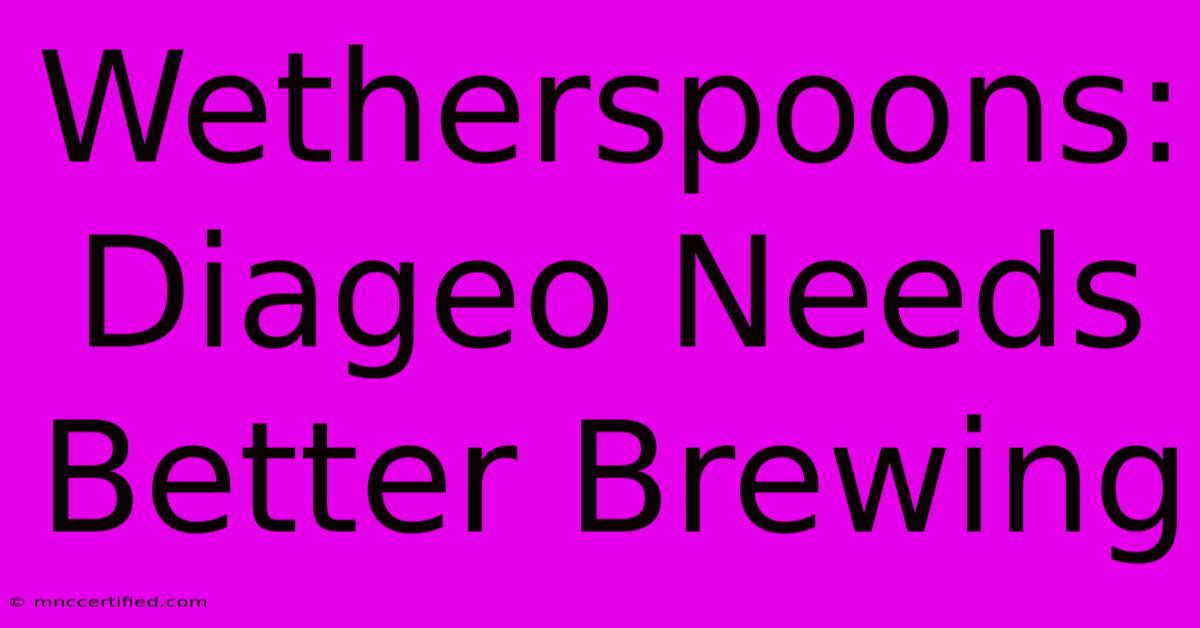Wetherspoons: Diageo Needs Better Brewing

Table of Contents
Wetherspoons: Diageo Needs Better Brewing to Keep the Pints Flowing
JD Wetherspoon, the UK's pub giant, and Diageo, the world's leading premium drinks company, have a long-standing relationship. However, recent trends suggest that Diageo needs to seriously reassess its brewing strategies to maintain its prominent position within Wetherspoon's extensive pub network. This article delves into the reasons why Diageo's offerings aren't quite hitting the mark and explores potential solutions for a more fruitful partnership.
The Wetherspoon Effect: A Powerful Platform
Wetherspoon's influence on the UK pub scene is undeniable. Its vast network and price-competitive model make it a crucial platform for any brewer hoping to reach a mass market. High-volume sales are a key driver for breweries, and Wetherspoon's scale offers exactly that. Securing a prominent position on their extensive beer list can translate to significant increases in brand awareness and revenue. However, this comes with a caveat: Wetherspoon's customers are discerning, and only the best value and quality products will consistently succeed.
Diageo's Current Position: Room for Improvement
While Diageo boasts globally recognized brands, its performance within Wetherspoon's pubs requires closer examination. Many drinkers perceive some Diageo beers as lacking character and innovation compared to craft beers and smaller, independent brewers, who are increasingly gaining traction in the market. The demand for unique flavor profiles and locally sourced ingredients has risen, leaving some of Diageo's more mainstream offerings slightly behind the curve. This presents a crucial challenge: how to maintain market share in a fiercely competitive landscape.
The Need for Innovation and Adaptability
Diageo needs to adopt a more dynamic approach to brewing for the Wetherspoon market. This includes:
- Investing in craft beer styles: Expanding its portfolio to include craft beers with unique, bolder flavor profiles could attract a younger demographic and appeal to a more discerning customer base.
- Focusing on local sourcing: Utilizing locally sourced ingredients can add a unique selling proposition, appealing to consumers seeking ethical and environmentally friendly options. This taps into the growing trend of supporting local businesses and reducing carbon footprints.
- Improving value for money: While quality is paramount, the price point remains critical within the Wetherspoon model. Diageo needs to ensure its offerings are competitively priced without compromising quality.
- Enhanced Brand Storytelling: Consumers are increasingly drawn to brands with compelling narratives. Diageo should invest in showcasing the history, brewing processes, and unique characteristics of its beers to improve their appeal.
Beyond the Pint: A Strategic Partnership
The relationship between Wetherspoon and Diageo is strategic. It's not simply about selling beer; it's about building brand loyalty and maintaining a strong market presence. Diageo's success in Wetherspoon's pubs depends on understanding the pub chain's customer base and responding to the evolving demands of the market. This requires a deeper understanding of consumer preferences and a willingness to adapt brewing strategies accordingly.
The Future of the Partnership
Ultimately, the success of Diageo within the Wetherspoon ecosystem hinges on its ability to innovate, adapt, and deliver high-quality, value-driven beers that resonate with Wetherspoon's diverse clientele. Failure to do so could see Diageo lose market share to more agile and innovative competitors. A renewed focus on crafting unique, competitively priced, and ethically sourced beers is essential to maintaining its crucial position within the UK's largest pub chain. The time for innovation is now; the future of Diageo's pint sales with Wetherspoon depends on it.

Thank you for visiting our website wich cover about Wetherspoons: Diageo Needs Better Brewing. We hope the information provided has been useful to you. Feel free to contact us if you have any questions or need further assistance. See you next time and dont miss to bookmark.
Featured Posts
-
Honda And Nissan Merger Discussions Start
Dec 18, 2024
-
Joey Barton Faces Malicious Communication Charges
Dec 18, 2024
-
Guinness Shortage Hits Uk Pubs
Dec 18, 2024
-
Connolly Beats Aoc In Congressional Race
Dec 18, 2024
-
Carabao Cup Eight Clubs Quarterfinal Hopes
Dec 18, 2024